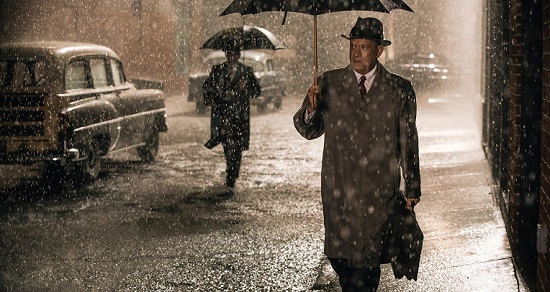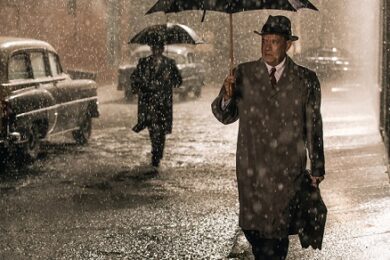Context is everything. If Steven Spielberg had attempted to make Bridge Of Spies at the start of his career, the wunderkind would quickly have found himself ostracized, his cinematic output reduced to the kind of home movies he made in his teenage years. They’d have said, “The Reds are under the bed, Steven. You don’t invite them into it.” Even today some of the warped, rheumy-eyed hawks on the right, the type who can smell a Commie in anyone who doesn’t embrace the American financial system with the enthusiasm of Patrick Bateman, will probably look at Bridge Of Spies and see the King of Tinstletown playing the Pinko apologist.
Spielberg’s views have in fact remained remarkably consistent in the 45 years since he made Duel in 1971, which is to say democratic, patriotic, populist and optimistic. Some would add naïve, cynical, sentimental and exploitative. At one time or another they’ve all been right – the man has directed 30 films, after all, and produced probably three times as many. His box office takings as a director alone amount to something in the region of $9billion. As he approaches 70, the all-American boy whose cinematic pursuit of happiness has carried half the world along with him, might feel like sitting back and basking in some of that signature ‘God light’ of his, but then such behaviour would take the Spielberg out of Spielberg.
So where to put Bridge Of Spies in this vast cinematic treasure house? There is some continuation of themes laid out in his previous film Lincoln – pivotal moments in America’s past, individuals burdened by tremendous historical pressure – but Bridge of Spies draws back somewhat from the Byzantine struggles that make Lincoln feel like a brilliantly sprawling period West Wing. Here the visual storytelling provides broader strokes, bringing other Spielberg themes to the fore, namely male friendship and loyalty, the courage and integrity of the individual in the face of media-whipped public hysteria, notions of chivalry symbolized in the Good Soldier, whether it’s American insurance lawyer James Donovan (Tom Hanks), Russian spy Rudolf Abel (Mark Rylance) or the U2 pilot Gary Powers (Austin Stowell). And like all historical dramas, there is a conversation going on with the present, in this case about what has become of those Cold War fears and neuroses now the Cold War is over, the suggestion being they’ve leaked into everything else, a bit like radioactive gas from one of the earlier era’s science fiction B-movies.
Bridge Of Spies starts in 1957 in Brooklyn, the tyrannizing paranoia of Senator McCarthy on the wane, but tensions maintained by the knowledge the Soviets were catching up in the nuclear arms race, not to mention Sputnik, the world’s first satellite, violating American airspace throughout October that year. All this fear and suspicion would eventually culminate in the Cuban Missile Crisis, but here it’s conveyed in a scene that sees schoolchildren pledging allegiance to the flag before sitting down to watch the famous ‘Duck and Cover’ government information film. It’s a classically Spielbergian touch, combining nationhood, kids, cartoons, suburban anxiety, allusions to the cinematic medium, even perhaps a nod to Kubrick’s Dr Strangelove in the implicit black comedy of children being tutored by Bert the Turtle on what to do should a fifteen megaton nuclear weapon detonate in the neighbourhood. Answer: crawl under a table. As to the emotional fallout, Spielberg immediately cuts to Donovan returning home from work to find his young son deep in preparation for the End Times.
Bridge Of Spies essentially falls into two acts – the first explores the relationship that develops between Donovan and Abel, the lawyer representing the spy in what is deemed a PR exercise designed to show American justice being done, “in a court of law, not a kangaroo court” as Donovan puts it. Nevertheless, a kangaroo court is pretty much what he gets, something he takes exception too, especially now he’s had a chance to see the principled stuff Abel is made of, the spy refusing to become a double agent in return for his freedom, despite facing the prospect of the electric chair.
Hanks’s portrayal of Donovan has more than a little of Spencer Tracy to it, especially from later courtroom dramas like Inherit The Wind and, even more pertinently, Judgement At Nuremberg. Tracy is something akin to a celluloid surrogate father for Spielberg, and Hanks possesses similarly quiet and steely qualities. Donovan is man who refers to the Constitution as “the rule book” and doggedly sticks to it, he talks about these rules defining what it means to be American. This is bound to have some people cringing at its worthiness, Spielberg in Norman Rockwell mode, but given Donovan says all this to a CIA agent who is urging him to put aside attorney-client privilege, it seems clear that Bush’s Patriot Act is the subtext.
Rylance as Rudolf Abel dominates much of the first half of the film. In a brilliant opening seven-minute sequence – notable for a complete absence of music – we see him as an artist, staring at his double in the mirror as he works on a self-portrait, then journeying around New York doing the things sleeper spies do, before finally being collared by the CIA back at his rundown apartment. Spielberg’s fondness for doubling, seen in the opening shot, finds its echo in Abel’s meeting with Donovan. They are in many ways reflections of each other, Rylance even managing to outdo Hanks in understatement, providing a performance so still as to take on the qualities of an Eastern sage.
Great performances though they are, they’re likely to prompt a criticism persistently levelled against Spielberg, namely that he’s taken a moment in history, emptied it of its historical charge and assimilated it into stock Hollywood fare. As men of principle, wouldn’t Donovan and Abel discuss the ideologies that support their principles? So where’s their conversation on the respective merits and demerits of capitalism and Communism? While it’s true that another filmmaker might play up their symbolic functions, in its place we don’t simply get buddy-movie shtick. What Hanks and Rylance achieve is a subtle and finely tuned correspondence that draws on Spielberg’s fascination with chivalric codes of honour, and how these codes might manifest themselves in cultures that only pay lip service to them. Finally there’s the obvious rejoinder, namely that you don’t come to a Spielberg movie with a desire to be educated in Hayek’s economic liberalism or Marxist dialectic.
The second act takes place in Berlin in 1962, six months after ‘Operation Rose’ was initiated, the GDR deciding that the best way to stop so many East Germans fleeing their workers paradise for the ‘escape hatch’ of West Berlin was to build a wall around West Berlin, described in shameless Orwellian terms by the GDR as a ‘protective measure’, though no one was under any illusions as to which way the traffic was moving.
It’s into this political powder keg that Donovan is dispatched, his mission now to oversee an exchange of spies – the crashed U2 pilot Gary Powers (Austin Stowell) with Rudolf Abel, a man Donovan now pointedly refers to as “my guy”. Muddying the waters still further are an American student Frederic Pryor (Will Rogers) who’s been trapped on the wrong side of the Wall, and Wolfgang Vogel (Sebastian Kock) as an East German official eager to make some political capital out of Pryor in an effort to assert some independence from his Soviet masters, here in the shape of KGB operative Ivan Schischkin (Mikhail Gorevoy).
The Coen brothers’ contribution to Matt Charman’s screenplay seems most apparent in this second act, the film oscillating somewhere between Capra and Le Carre, drawing out the comic absurdities in all the Machiavellian manoeuvring, the vain shuffling about the chessboard, not to mention the surreal activity at the heart of it all – 18,000 concrete posts, 300 tons of barbed wire and a seemingly infinite number of breeze blocks to build a Wall designed to divide a 600-year-old city. In time this Wall would acquire a hinterland fence, a border signal fence, dragons teeth surface barriers, observation towers, anti-vehicle crash barriers and the notorious ‘death strip’.
The film lays it on a bit thick in the last ten minutes, becomes a little too Spielbergian, the narrative neatly restored to order, excessively telegraphing the visual contrasts – people being shot trying to jump the wall in Berlin are echoed later by kids joyously jumping backyard fences in the free air of Brooklyn. But then, as the critic J Hoberman observes, “Spielberg puts his faith in the redemptive nature of Hollywood entertainment”, and you really should know that by now. Besides, history does occasionally bear out Spielberg’s sentimentality, his optimism – in the end, the Berlin Wall stood for less than 30 years. The wunderkind has been making movies for a lot longer than that.
Bridge Of Spies is in cinemas now



